Food Loss Related News

Towards the development of post-harvest management policy and strategy in Burkina Faso
14/04/2017
Towards the development of post-harvest management policy and strategy: supporting a strategic roadmap for the reduction of post-harvest losses in cereals and pulses in Burkina Faso
On 15 March 2017, key stakeholders met in Ouagadougou to discuss technical, policy and s...

MIT study reports improved income, food security and well-being for Ugandan farmers participating in WFP’s Zero Food Loss initiative
20/03/2017
The Massachusetts Institute of Technology (MIT) carried out an independent study about the scalability and adaptability of post-harvest hermetic technologies based on the WFP Special Operation in 2015. The study focused on scalability, adaptability and impact of the project to Ug...

Improving our estimates of postharvest losses: APHLIS+ launch
21/09/2016
Launched in 2009, APHLIS is a scientific model which provides evidence-based estimates on postharvest cereal losses (PHLs) across 38 countries in sub-Saharan Africa.
The APHLIS+ network meeting, hosted by the Natural Resources Institute in Accra (Ghana) 5-9 September 2016, provided ...

Validation workshop of Burkina Faso food loss assessments report
30/08/2016
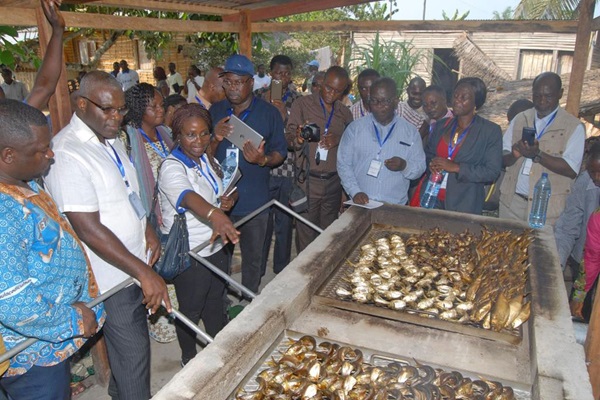
FAO regional workshop for food loss reduction strategy development
15/06/2016

New CoP Forum discussion on PHL reduction policy development
11/04/2016

Food Losses & Waste in the chain, a short course by WageningenUR
17/11/2015

Micro-nutrient loss in food loss and waste in fruit and vegetables, two FAO studies presented at the 1st PHL Congress in Rome
05/11/2015

Post-Harvest Management/Food Loss Reduction workshop in Jinja, Uganda
24/09/2015
The Swiss Agency for Development and Cooperation (SDC) and the UN Rome based agencies (FAO, IFAD and WFP) co-organized a workshop on Post-Harvest Management (PHM) / Food Loss Reduct...

Launching the RBA joint project's food loss reduction activities for smallholders in Uganda
13/04/2015

New CoP online discussion in the Forum
02/03/2015
Your contribution in collecting and describing existing postharvest loss (PHL) assessment methodologies can make the difference!
After the consultation undertaken to get CoP members’ insights about the preferred topics of discussion, a new thread has been launched on

Food Losses and Waste Initiative: From Prevention to Valorisation
30/01/2015

Small-scale Postharvest Handling Technologies Short Course/Study Tour
10/01/2015
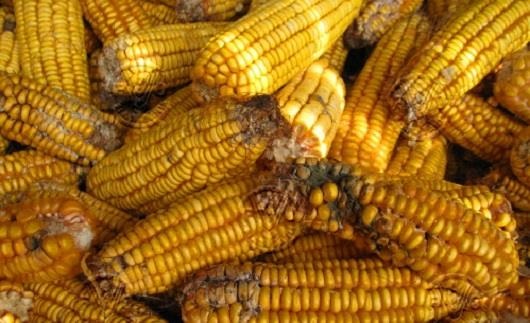
Ongoing online discussion forum on losses occurring along maize supply chains
21/10/2014
What are your experiences in levels of grain losses, particularly maize? How were they measured? What solutions can be/were implemented to reduce these losses? What success stories can you share with the Community?
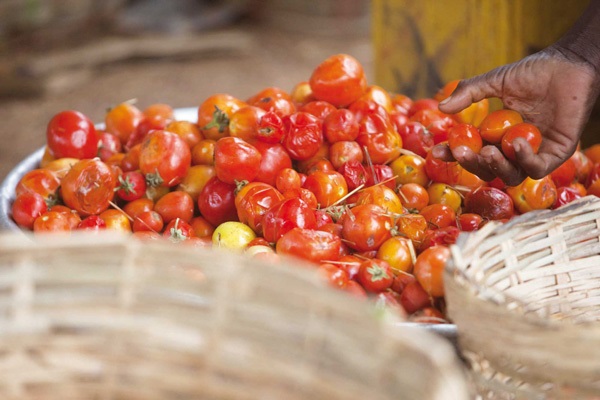
CFS 41 Session – HLPE report on “Food losses and waste in the context of sustainable food systems”
30/09/2014
-malabo-declaration-on-agriculture-and-postharvest-losses.tmb-th600x400.jpg?Culture=en&sfvrsn=89f7d970_1)
African Union (AU) Malabo Declaration on Agriculture and Postharvest Losses
29/09/2014
The AU launched 2014 the “Year of Agriculture and Food Security” marking the 10th anniversary of the Comprehensive African Agriculture Development Programme (CAADP) on January 30, 2014 during its 22nd Assembly in Addis Ababa, Ethiopia...
Food Loss Related Publications
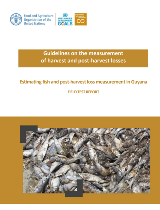
Estimating fish and post-harvest loss measurement in Guyana
20/12/2020
This report presents details about the training workshop and experience gained from testing of the Guidelines on fish loss measurement. It includes situation analysis, training needs assessment (TNA), selection of participants, goal and objectives, training description, preparation of training, delivery of training, and evaluation.

Mitigating risks to food systems during COVID-19: Reducing food loss and waste
08/12/2020
The COVID-19 pandemic continues to wreak havoc globally, generating significant challenges that could result in risks to food security and nutrition in many countries. Countries are ordering lockdowns, restricting movement and observing physical distancing to curb the pandemic.

Post-harvest management of papaya to ensure quality and safety
30/11/2020
Guidance for stakeholders in the horticultural supply chain. Good post-harvest handling is important in maintaining the quality and safety of papayas as they are transported from the farm to the market.

Post-harvest management of papaya to ensure quality and safety
29/11/2020
Guidance for stakeholders in the horticultural supply chain. Good post-harvest handling is important in maintaining the quality and safety of papayas as they are transported from the farm to the market.

Guidelines on the measurement of harvest and post-harvest losses – Estimation of crop harvest and post-harvest losses in Malawi (maize, rice and groundnuts). Field test report
31/10/2020
A study was conducted in two Agriculture Development District (ADDs) of Malawi, Salima and Lilongwe, to pilot a new methodology for estimating on-farm harvest and post-harvest losses. The study was carried-out with technical support from the Global strategy to improve agricultural and rural statistics (GSARS) of the Food and Agricultural...

Addressing Food Loss and Waste: A Global Problem with Local Solutions
08/09/2020
The report focuses on the role that food loss and waste (FLW) could play in reducing the environmental footprint of food systems while attempting to meet the caloric and nutrient needs of a population expected to increase by 3 billion people in the next 30 years. The performance of the global food system over the last century has been extraordinary.

Food systems and COVID-19 in Latin America and the Caribbean. How to reduce food loss and waste
07/07/2020
The ongoing pandemic has threatened the food and nutritional security of millions of Latin Americans and Caribbean people. These interruptions in the links of the value chain of the agri-food system have resulted in greater food loss and waste. We are not yet in a position to say when the rate of contagion will decrease, or when we will return to normal. Such uncertainty makes it imperative to analyze how food losses and waste affect food systems, how how this can be prevented.

E-learning: Food Loss and waste in fish value chains
01/06/2020
Food Loss and Waste (FLW) in the fisheries sector is a complex issue with multiple and interrelated causes at different levels. Policy makers, the public and private sectors require solutions not only to be economically beneficial, but also to generate or sustain benefits for society.
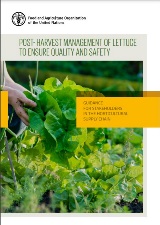
Post-harvest management of lettuce to ensure quality and safety
30/04/2020
Guidance for stakeholders in the horticultural supply chain. Good post-harvest handling is important in maintaining the quality and safety of lettuce as they are transported from the farm to the market.
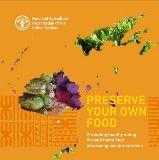
Preserve your own food | Promoting healthy eating through home food processing and preservation
28/02/2020
This booklet is a practical manual presenting the simple techniques used to preserve starchy staples, dark leafy green vegetables, fruits and vegetables in Fiji. The first half of the booklet provides a general introduction to the basic principles of food preservation and spoilage. Methods of preservation are then defined including solar drying technique for the processing of local starchy staples and dark green leafy vegetables into flour and leafy green powder.

Amélioration de la gestion des pertes après-récolte dans les filières céréales et légumineuses au Burkina Faso
01/02/2020
Cette note d’orientation politique est basée sur les travaux de l’atelier de consultation national qui s’est tenu à Ouagadougou au Burkina Faso le 15 mars 2017, dans le cadre du projet «Intégration des initiatives pour la réduction des pertes alimentaires pour les petits producteurs dans les zones à déficit alimentaire» décrit ci-après.

Addressing Food Loss and Waste : A Global Problem with Local Solutions
31/01/2020
The report focuses on the role that food loss and waste (FLW) could play in reducing the environmental footprint of food systems while attempting to meet the caloric and nutrient needs of a population expected to increase by 3 billion people in the next 30 years.
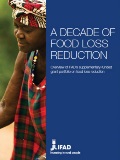
A decade of food loss reduction
01/01/2020
An overview of IFAD’s supplementary-funded grant portfolio on food loss reduction. According to recent estimates, 14 per cent of the world’s food production is lost before it reaches the consumer. Food losses disproportionately affect developing countries, threatening people’s livelihoods, especially those dependent on agriculture.
-background-paper.tmb-th600x450.jpg?Culture=en&sfvrsn=6f2094b4_1)
The International Year of Fruits and Vegetables (IYFV-2021)|Background Paper
01/01/2020
This background paper outlines the benefits of fruit and vegetable consumption, but also examines the various aspects of the fruit and vegetable sector from a food systems approach: from sustainable production and trade to loss and waste management.

Post-harvest management of green mustard to ensure quality and safety
01/01/2020
This brochure was developed to display the results of the FAO Technical Cooperation Project: TCP/TIM/3310, Capacity-development to reduce post-harvest losses in horticultural chains in Greater Mekong Subregion (GMS) countries. Improvement in the implementation of good practice in post-harvest handling to assure safety were piloted. This brochure aims to provide information on...

Food Waste to Wealth Post-harvest Loss from Farm Gate to Market
01/12/2019
‘Sustainable Development Goal 2: Zero Hunger’ aims to ensure food security at global level. However, one of the major challenges in ensuring food security is post-harvest losses, which is highly prevalent in CIRDAP member countries. This post-harvest loss is a contributing element to the overarching concepts of food waste and food loss.

Smallholder Farmer Perceptions of Postharvest Loss and Its Determinants in Fijian Tomato Value Chains
01/11/2019
The Fiji Islands, like many small Pacific island nations, are thought to incur high rates of postharvest loss. Little work has been undertaken to quantify the amount of loss within Pacific horticultural value chains, or identify the key determinants. This study sought to quantify postharvest loss within Fijian smallholder tomatoes producers.

The State of Food and Agriculture 2019. Moving forward on food loss and waste reduction
14/10/2019
Reducing food loss and waste is widely seen as an important way to reduce production costs and increase the efficiency of the food system, improve food security and nutrition, and contribute towards environmental sustainability. Growing attention to food loss and waste is reflected in the Sustainable Development Goals (SDGs).
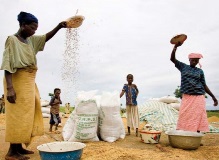
Analyse des pertes alimentaires: causes et solutions. Études de cas sur le sorgho, le maïs, le niébé au Burkina Faso.
01/09/2019
Deux études ont été conduites au Burkina Faso pour une analyse approfondie des pertes après-récolte et de leurs causes le long des chaînes d’approvisionnement (CA) du sorgho, du maïs et du niébé.La première étude sur le terrain des pertes après-récolte a été conduite entre les mois d’octobre 2015 et d’avril...
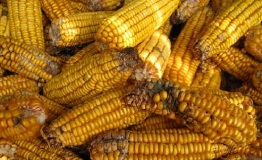
Analyse des pertes alimentaires: causes et solutions. Études de cas sur le maïs et le riz en République démocratique du Congo.
01/04/2019
Deux études ont été conduites en République Démocratique du Congo (RDC) pour une analyse appro-fondie des pertes après-récolte et de leurs causes le long des chaînes d’approvisionnement (CA) du maïs et du riz.La première étude sur le terrain des pertes après-récolte a été conduite entre les mois d’avril et septem-bre...
Food Loss Related Events
15/ 10
2014
Exclusive Food Tank Webinar Series: Reducing Food Losses From Farm to Market
Virtual Event, 15/10/2014
This webinar will present current evidence of high levels of global postharvest food losses, identify the causes and sources of losses occurring between the farm and the market, and provide information on a wide range of options for using simple, cost eff
14/ 10
2014
41st session of the Committee on World Food Security (CFS) Side event ‘Getting into Action on Food Losses and Waste (FLW)’
Rome (Italy), 14/10/2014
41st session of the Committee on World Food Security (CFS) Side event ‘Getting into Action on Food Losses and Waste (FLW)’ co-organized by the Swiss Agency for Development and Cooperation (SDC) and the Rome-based UN Agencies Food and Agriculture Organizat
13/ 10
2014
13/1
2015
Ongoing online discussion forum on losses occurring along maize supply chains: levels, causes, solutions and success stories
Virtual Event, 13/10/2014 - 13/01/2015
“What are your experiences in levels of grain losses, particularly maize? How were they measured? What solutions can be/were implement to reduce these losses? What success stories can you share with the Community? ” In Kenya, the SAVE FOOD Initiative and
